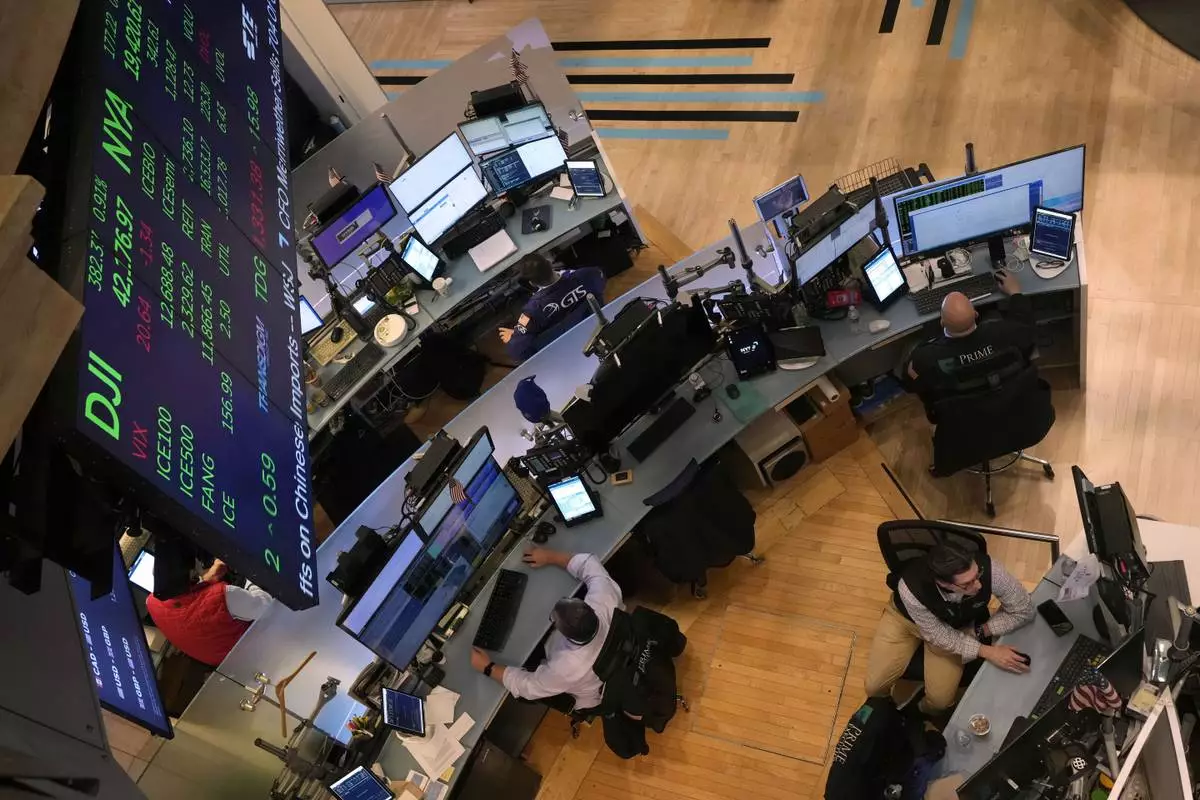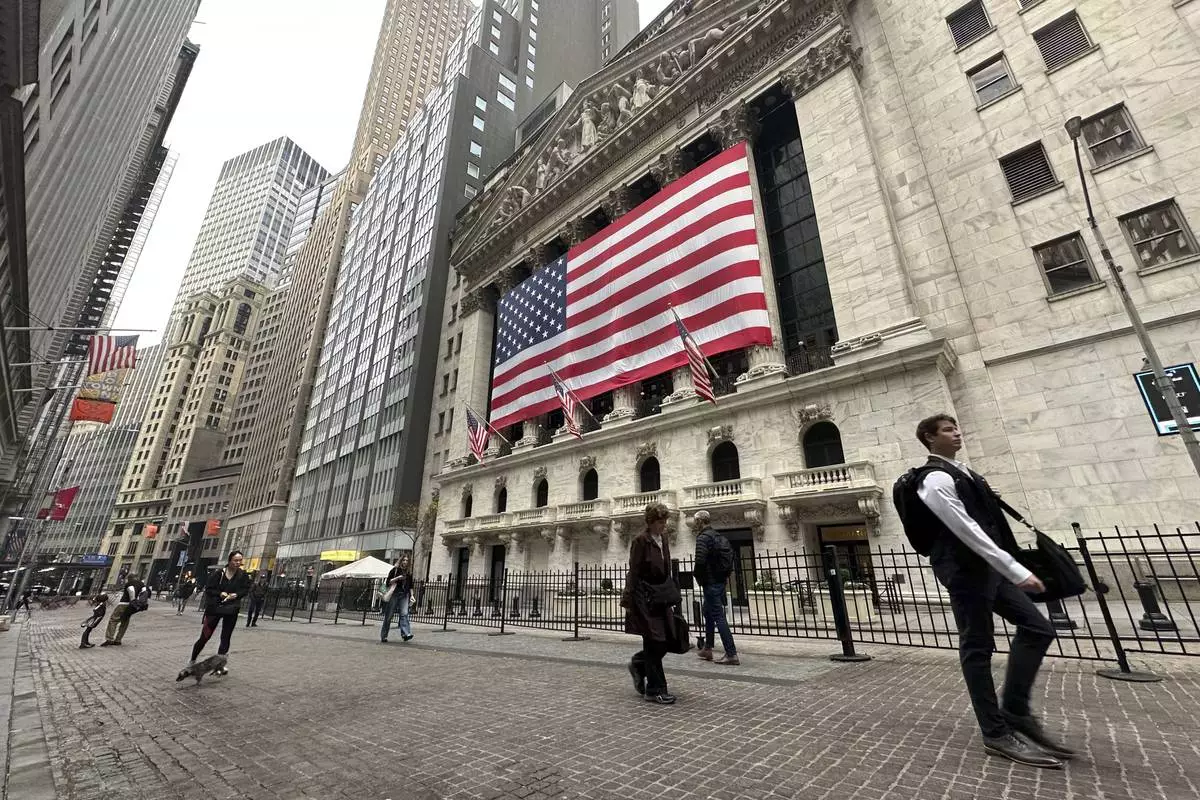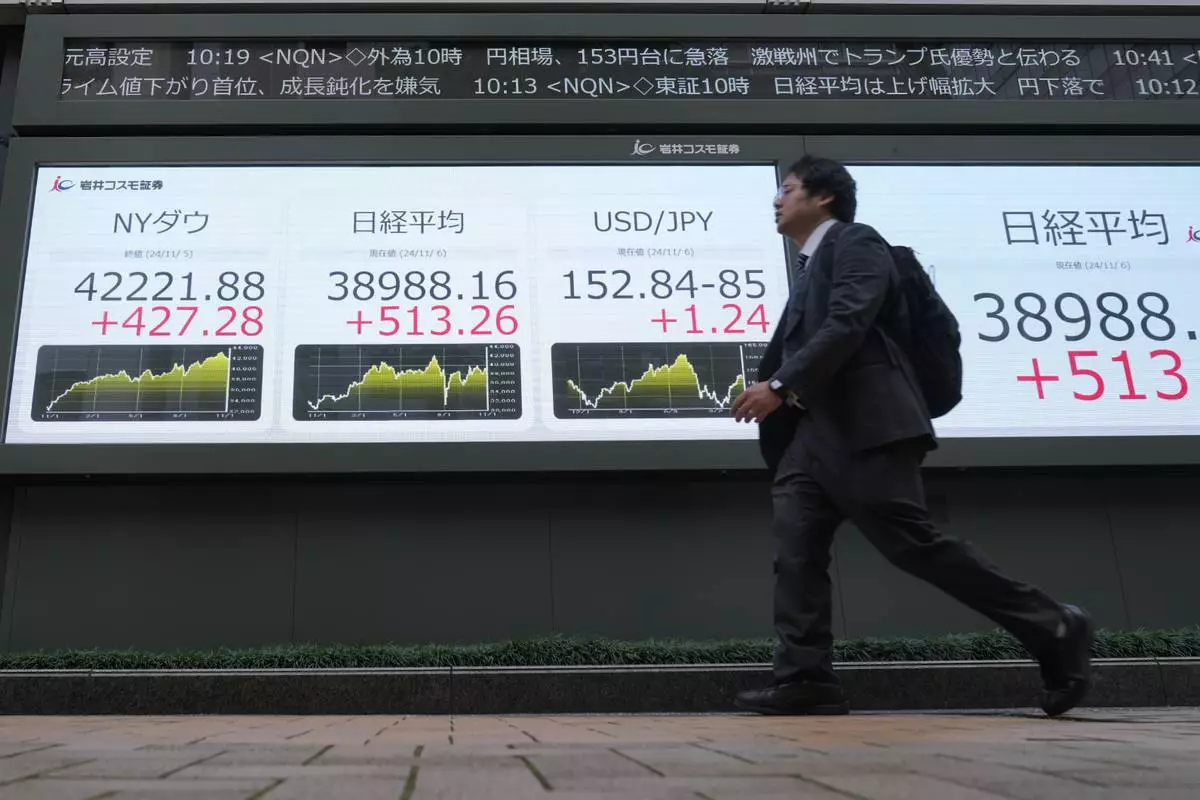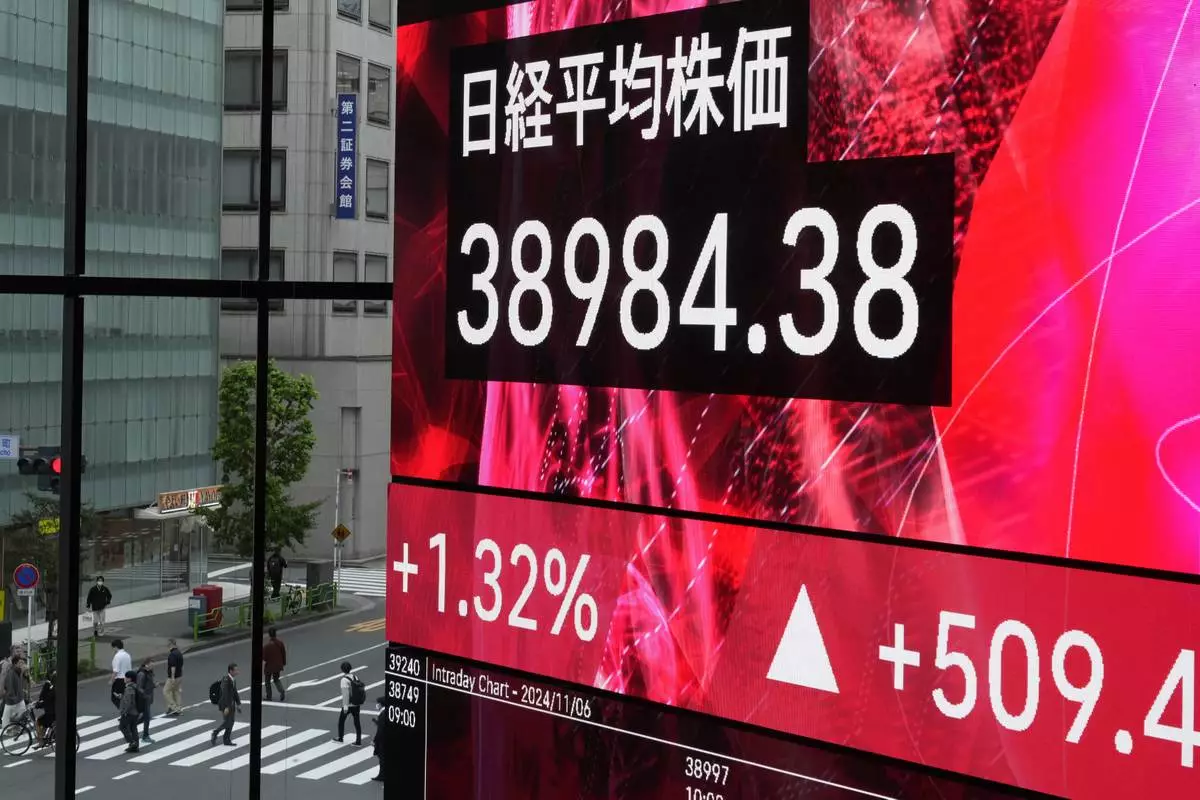DETROIT (AP) — Between redistricting and incumbents forgoing reelection, four congressional seats in Michigan were key targets as the parties vied for control of the U.S. House of Representatives.
Republicans sought to flip two open congressional seats in central Michigan as the GOP tries to broaden its majority. Both were redrawn in 2021, yielding Democratic victories in the midterm elections. Now this year's races have been true tossups, some of the most competitive in the country, with millions of dollars poured into the campaigns.
Incumbents easily won Michigan’s other congressional races. They include Republicans Jack Bergman, John Moolenaar, Bill Huizenga, Tim Walberg and Lisa McClain; and Democrats Debbie Dingell, Haley Stevens, Rashida Tlaib and Shri Thanedar.
After longtime Democrat Dan Kildee announced he would not seek reelection in Michigan's 8th District, Republicans saw the first opportunity in decades to flip the seat red. Kildee had served since 2012 when he succeeded his uncle Dale Kildee, who represented the area including the cities of Flint and Saginaw in Congress for 36 years.
For Republicans, former news anchor and Trump administration immigration official Paul Junge is making his third bid for Congress after losing to the younger Kildee in 2022 by about 10 points.
The race is too early to call.
Junge appealed to voters over economic and immigration concerns. He also attacked Democrat Kristen McDonald Rivet over national security and sought to tie her to a Chinese-based battery manufacturing company looking to build in Michigan that has been a target for Republicans.
McDonald Rivet, a freshman state senator, painted Junge as a Californian outsider and cast herself as a middle class pragmatist. She focused her messaging on preserving reproductive rights and like her opponent, the economy.
Republican Tom Barrett won his bid for Michigan’s 7th congressional district, flipping the open seat in central Michigan away from Democrats. Barrett prevailed against Democrat Curtis Hertel Jr. in a competitive race for the seat that includes the state capital of Lansing.
Barrett is a former state representative and senator. He previously ran for the same seat in the 2022 midterms but lost to Democrat Elissa Slotkin, who vacated the seat to run for U.S. Senate.
Hertel is a former state senator who more recently served as Democratic Gov. Gretchen Whitmer’s legislative director.
Their race was expected to be one of the closest in the country. Both candidates criticized the other over national issues such as reproductive rights and national security. Barrett tried to appeal to crossover voters with messaging on inflation, the economy and security at the southern border.
Hertel conceded to Barrett in a statement at 3 a.m. by wishing the Republican well and thanking his own supporters.
“To every single volunteer, supporter, and member of Team Hertel who helped our campaign—from building yard signs, to donating a few bucks, to knocking doors and making calls—I will forever be grateful, and I am sorry this election did not turn out differently," the statement said.
Democratic freshman U.S. Rep. Hillary Scholten has secured her second term representing Michigan in Congress.
In 2022, Scholten became the first Democrat to represent the city of Grand Rapids in the U.S. House since the 1970s after the district was redrawn.
“I set out to build a new political home in West Michigan, and with this decisive victory, we’ve proven that what we made is built to last,” Scholten said in a statement posted to X.
However, the district in western Michigan is still seen as a Republican stronghold, especially in the populous Kent County. The Republicans targeted the county with multiple visits as former President Donald Trump campaigned to return to the White House.
The county went for Trump in 2016 and President Joe Biden in 2020.
Voters in Michigan's 10th congressional district — which includes the all-important suburbs of Macomb County north of Detroit — will decide a rematch between Republican incumbent Rep. John James and Democrat Carl Marlinga.
Marlinga lost by just 1,600 votes in 2022, and the district is now seen as competitive, drawing money and attention from Democratic national groups.
The race is too early to call.

Michigan Democratic House candidate Curtis Hertel speaks at a campaign rally for Democratic presidential nominee Vice President Kamala Harris at Jenison Field House on the campus of Michigan State University, Sunday, Nov. 3, 2024, in East Lansing, Mich. (AP Photo/Paul Sancya)

Rep. John James, R-Mich., speaks before Republican presidential nominee former President Donald Trump during a campaign rally at Macomb Community College Friday, Nov. 1, 2024, in Warren, Mich. (AP Photo/Paul Sancya)
HONG KONG (AP) — Share prices, bond yields and bitcoin surged Wednesday as the Republican party gained control of the Senate and former President Donald Trump closed in on the 270 electoral votes needed to return him to the White House.
The full results of Tuesday's election may not be known for days as officials count all the votes, but investors already were repositioning in anticipation of sweeping gains by the Republicans, who took control of the Senate for the first time in four years. The results of the House elections were not yet finalized.
Trump won the battleground state of Georgia, a Republican stronghold that had voted for Democrats in 2020. A win in North Carolina helped Trump narrow Vice President Kamala Harris’ pathways to victory. Clinching Pennsylvania took him within 3 electoral votes of the 270 needed to become the next president.
The expectation is that a victory by Trump will lead to faster economic growth and more market-friendly policies.
Ahead of U.S. markets opening Wednesday, the future for the S&P 500 gained 1.23% and the future for the Dow Jones Industrial Average was up 1.02%. The Nasdaq composite future was 1.43% higher.
The price of bitcoin jumped nearly 8% to a record $75,345.00, as investors bet on a victory for Trump, who has pledged support for cryptocurrencies. It later fell back to $74,520.00.
Bond yields also surged, with the yield on the 10-year Treasury climbing to 4.4% from 4.28% on Tuesday.
“The markets are scrambling to figure out what happens next, but for the time being, the market is pricing in a higher growth and higher inflation outlook,” Peter Esho of Esho Capital said in a commentary.
In early European trading, Germany's DAX climbed 1.3% to 19,503.40, while the CAC 40 in Paris advanced 1.9% to 7,550.36. Britain's FTSE 100 was up 1.4% at 8,285.06.
Markets worldwide have been fixated on what the election will mean for U.S. economic, monetary and trade policy, as well as geopolitics. A split in Congress between political parties would complicate policymaking, and a White House headed by Trump could have far reaching ramifications given his support for sharp increases in tariffs, especially on imports from China.
The dollar surged against both the Mexican peso and the Chinese yuan, two key trading partners expected to be significantly affected by tariff increases. It was also up against the yen and the euro.
The broad U.S. stock market has historically tended to rise regardless of which party wins the White House, even if each party’s policies can help and hurt different industries’ profits.
Since 1945, the S&P 500 has risen in 73% of the years where a Democrat was president and 70% of the years when a Republican was the nation’s chief executive, according to Sam Stovall, chief investment strategist at CFRA.
The S&P 500 has risen nearly 70% since the 2020 election brought President Joe Biden into office. It rallied to records as the U.S. economy bounced back from the COVID-19 pandemic and managed to avoid a recession despite a jump in inflation.
The economy was a key issue for inflation-weary U.S. voters who chose Trump this time around, though mainstream economists have said Trump's policy proposals would make inflation worse.
Trump has also vowed to sharply raise tariffs on imports from China and other countries, darkening the outlook for Chinese exporters at a time when Beijing has relied heavily on ramping up manufacturing to try to revive its slowing economy.
“Positive outcomes for Harris are expected to boost Asian assets, while Trump gains may exert downward pressure,” Anderson Alves of ActivTrades said in a commentary.
Chinese markets have been among the most active in the region this week as leaders hold a meeting of the Standing Committee of the National People's Congress, the country's legislature.
The gathering is expected to deliver more moves to help spur faster economic growth and resolve mounting levels of local government debt. On Tuesday, upbeat comments by Premier Li Qiang about the potential for both fiscal and monetary policies helped lift share benchmarks in Hong Kong and Shanghai by more than 2%. Li also expressed confidence that China will attain its growth target of about 5% this year.
In Asian share trading Wednesday, Japan’s Nikkei 225 index gained 2.6% to 39,480.67, while the Kospi in Seoul shed 0.9% to 2,553.90.
Australia’s S&P/ASX 200 rose 0.8% to 8,199.50.
Hong Kong’s Hang Seng index fell 2.2% to 20,538.38, ending a three-day rally, as investors sought safe-haven assets amid the uncertainties surrounding the U.S. election. The Hang Seng Tech Index slipped 2.5%, while the Shanghai Composite index edged 0.1% lower, to 3,383.81.
In other dealings early Wednesday, U.S. benchmark crude oil lost 90 cents to $71.09 per barrel. Brent crude, the international standard, gave up $1.00 cents to $74.53 per barrel.

Traders work on the floor of the New York Stock Exchange, Tuesday, Nov. 5, 2024. (AP Photo/Richard Drew)

People pass the New York Stock Exchange in New York's Financial District on Tuesday, Nov. 5, 2024. (AP Photo/Peter Morgan)

A currency trader stands near the screens showing the Korea Composite Stock Price Index (KOSPI), left, the foreign exchange rate between U.S. dollar and South Korean won at a foreign exchange dealing room in Seoul, South Korea, Wednesday, Nov. 6, 2024. (AP Photo/Lee Jin-man)

Currency traders watch their computer monitors near the screens showing the Korea Composite Stock Price Index (KOSPI), left, the foreign exchange rate between U.S. dollar and South Korean won and the Korean Securities Dealers Automated Quotations (KOSDAQ), at a foreign exchange dealing room in Seoul, South Korea, Wednesday, Nov. 6, 2024. (AP Photo/Lee Jin-man)

Currency traders watch their computer monitors near the screens showing the images of Republican presidential nominee former President Donald Trump and Democratic presidential nominee Vice President Kamala Harris, and the Korea Composite Stock Price Index (KOSPI), right, at a foreign exchange dealing room in Seoul, South Korea, Wednesday, Nov. 6, 2024. (AP Photo/Lee Jin-man)

A man walks past an electronic stock board showing Japan's Nikkei 225 index, second left, at a securities firm Wednesday, Nov. 6, 2024 in Tokyo.(AP Photo/Shuji Kajiyama)

An electronic stock board shows Japan's Nikkei 225 index at a securities firm Wednesday, Nov. 6, 2024 in Tokyo. (AP Photo/Shuji Kajiyama)

Currency traders watch their computer monitors near the screens showing the images of Republican presidential nominee former President Donald Trump and Democratic presidential nominee Vice President Kamala Harris, and the Korea Composite Stock Price Index (KOSPI), right, at a foreign exchange dealing room in Seoul, South Korea, Wednesday, Nov. 6, 2024. (AP Photo/Lee Jin-man)

A currency trader walks by the screens showing the images of Republican presidential nominee former President Donald Trump and Democratic presidential nominee Vice President Kamala Harris, at a foreign exchange dealing room in Seoul, South Korea, Wednesday, Nov. 6, 2024. (AP Photo/Lee Jin-man)

A currency trader walks by the screens showing the foreign exchange rate between U.S. dollar and South Korean won at a foreign exchange dealing room in Seoul, South Korea, Wednesday, Nov. 6, 2024. (AP Photo/Lee Jin-man)





















